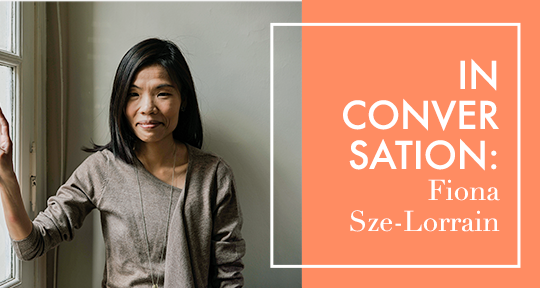Dear Chrysanthemums is a haunting debut novel by celebrated poet and translator, Fiona Sze-Lorrain. Covering an interconnected web of women, the novel begins during the tumult of early twentieth-century China and spans decades of displacement and exile across the world. At once brutal and tender, this novel of women’s lives has the power to move and complicate our understanding of the long shadow cast by revolution as well as the inextinguishable longing every person has for beauty, love, art, and selfhood. This spring, I had the opportunity to interview Sze-Lorrain about her powerful novel.
Tsering Yangzom Lama (TYL): There’s a dark irony and melancholy to your work. Symbols of beauty and luck frame stories of profound ugliness and misfortune. For instance, the title of your novel references a celebrated flower in China, but one of your characters, Mei, is tasked with picking chrysanthemums for Mao Zedong as part of her reform labor. Tell us about the juxtaposition between such auspicious symbols and the unsettled lives of the women in your novel.
Fiona Sze-Lorrain (FSL): I don’t believe in absolutes or polarities. There is no joy without sadness and vice versa. Spanish poet Miguel Hernandez: “I live in shadow, filled with light.” Chrysanthemums are symbolic flowers in Asia. I view them as both auspicious and ominous. A florist friend in Hong Kong once told me how she saved her freshest pink, white, and yellow chrysanthemums for a funeral wreath every other day.
In Chinese traditional ink wash, chrysanthemums are one of the “four noble gentlemen.” I’ve been painting chrysanthemums since I was a student yet find them the most elusive. How to make these flowers less figurative? That’s the question. At the same time they seem so perfect and delicious in each detail . . . If only they could speak.
I grow, cook, read chrysanthemums. I think of their psychic wholes. I too live with orchids and floral essences. Years ago, I came across a witchy chrysanthemum in a mokuhanga art by an old woman artist from northern Japan. I asked her how this larger-than-usual chrysanthemum might taste in a medicinal soup. She shook her head. The creature-like image followed me home. Those petals resembled fingers and squid tentacles. So erotic. How knotty. They pulled me in, then disquieted me. That distance—the vulnerability to the plant rendered its inner strength even more unyielding. This tension conjured in itself a story of survival. When I began to work on the heroines in my novel, I pictured them allegorically as chrysanthemums, each of a kind and from different seasons. And how they heal, apologize, or make amends when something goes wrong in life. READ MORE…


